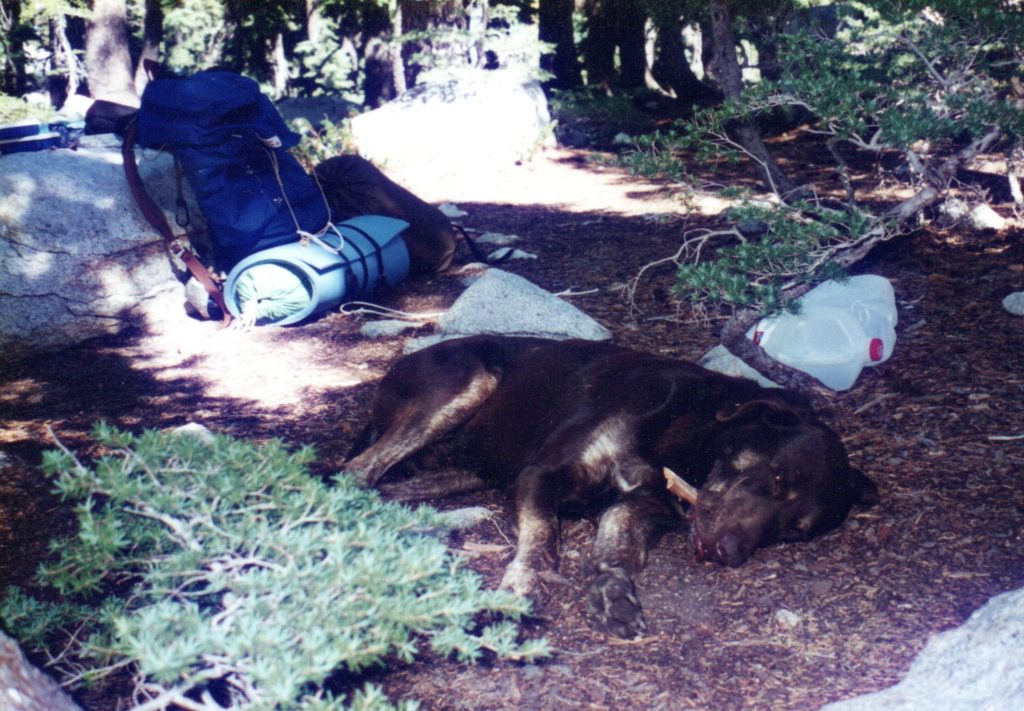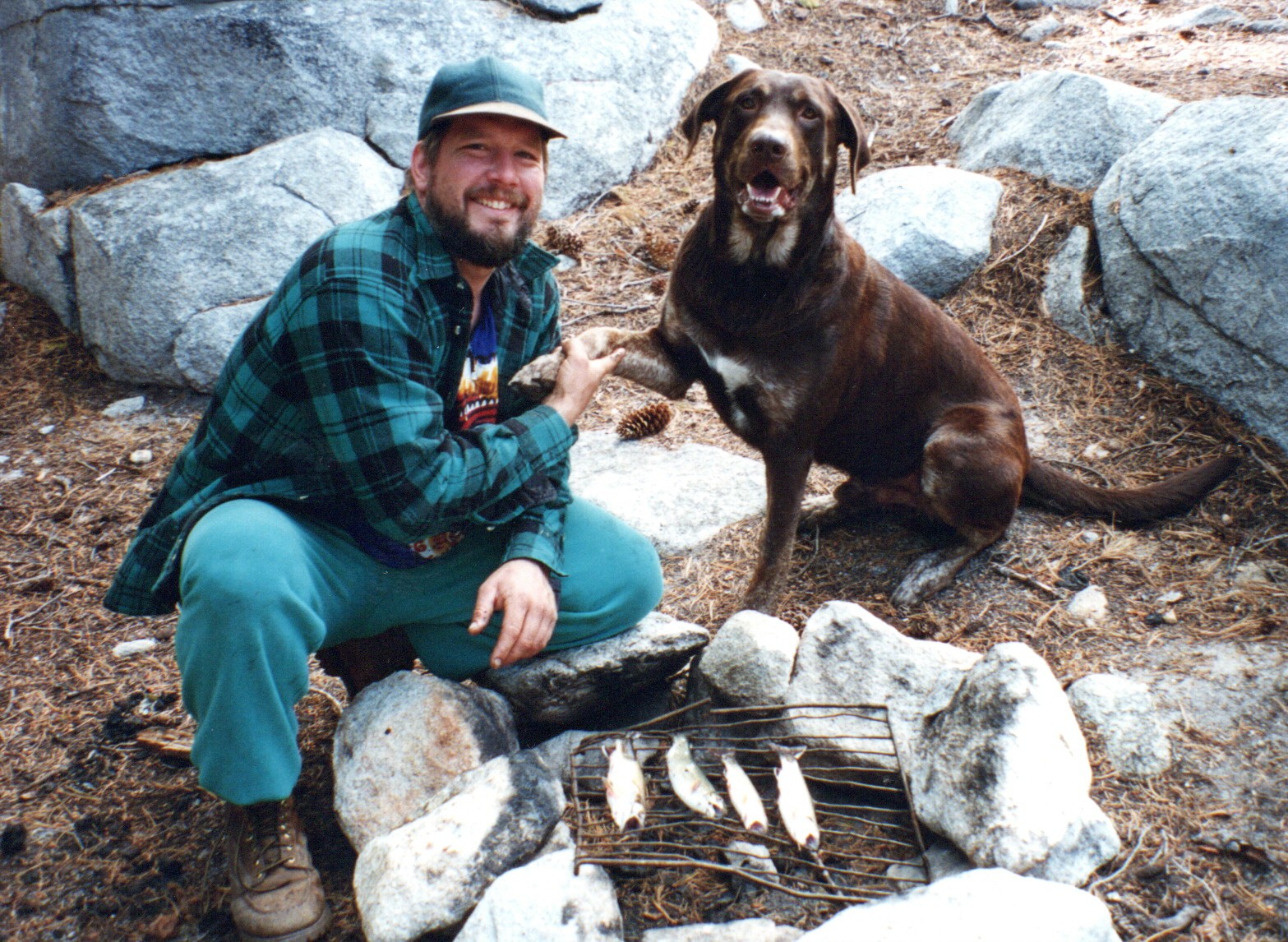“The greatest gift of life on the mountain is time. Time to think or not think, read or not read, scribble or not scribble – to sleep and cook and walk in the woods, to sit and stare at the shapes of hills. I produce nothing but words; I consume nothing but food, a little propane, a little firewood. By being utterly useless in the calculations of the culture at large I become useful, at last, to myself.”
— Philip Connors
By late afternoon I could feel the effects of the mushrooms wearing off, and awareness of the body and its needs returned. I had skipped lunch entirely – which was normal for a psilocybin trip – and had only ingested the contents of my water bottle since the oatmeal catalyst at dawn. Reluctantly, I left my forest sanctuary, where I had spent the late afternoon exploring the dramatic granite outcroppings that plunged deep into the pine needles from the south wall. This was the vicinity of the huge crack that Greg’s brother Chris and I had explored some years before, hoping to find a vein of gold. Today I was seeking riches of another kind, and came away with a stake that would hopefully last me a few years.
By the time I got back to camp Greg had already bathed and changed, as the autumn afternoon was getting too cool for our caveman outfits. He showed me his bounty – a string of fresh, jeweled trout hanging from a thin branch threaded through their gills. He wanted me to get a photo of him and Leroy Brown with the fish and the campfire, and the result was an endearing pose of sheer camaraderie and satisfaction. After my shower, I noticed that we needed much more wood for our fire. So, Greg devised a plan. He threw Leroy Brown’s precious stick as far as he could (the one that had been clamped in his jaws for most of the trail), and the huge dog bounded happily after it, muscles rippling in the slanted light. In no time at all he was back for another toss, and Greg faked a long throw and quickly hid the stick as Leroy Brown leapt away. By the time the poor dog noticed that no stick had been thrown, Greg was exhorting him excitedly, “Leroy, get the stick! Get the stick!”
He bolted heroically into the bushes around camp, looking for a reasonable substitute to keep the game going. He found a large stick of similar size, and dragged it back with his huge jaws. We laughed at our plan to trick Leroy Brown into gathering our firewood, and he probably would have done it for a lot longer if we hadn’t been mocking him so. As it was, he brought back several large sticks and half a tree. Or, at least it looked like half a tree as he dragged it laboriously back to camp, carving a great furrow in the pine needles, his neck muscles bulging like cords. That was the last straw (or stick), and thereafter, whenever Greg would try another fake throw, the great Rhodesian Ridgeback just looked at him disdainfully with an arched brow as if to say, “You gotta be kidding me.”
With our fun meter redlining, we started an impromptu contest of baseball with the game pieces found in greatest abundance all over the Trinity Alps: namely, sticks and rocks. We picked out a likely bat, and found the right sized rocks to pitch, and had a fine time until our hands were sore from the rough “bats” and heavy “balls.” Leroy Brown stopped being miffed, and tried to chase the batted rocks, and this was dangerous for him, besides. Instead, we switched to a throwing game. One of us “at bat” would pick out a target, and if it was missed, an out was recorded. If it was hit, the other would have to repeat the feat, or a run scored. We played game after game, and I won them all.
This was another foray deep into my past, for I had been an uncanny rock thrower all my life – probably for as long as I could fling them far enough to avoid hitting myself. I possessed a remarkable natural skill in this regard. For me, throwing was effortless and accurate, like pointing. Given the right size and shape of rock, and a reasonable range, my throws were nearly always in the vicinity of my target, and struck home with astonishing frequency. As a young boy, I often tossed stones at moving targets like birds, but never hit anything. When I reached puberty, my mind and arm locked into a weird psychic coordination, and whatever I saw, my arm could hit with a rock. Not always, of course, but often enough to be noteworthy. As a teenager, I began hitting those moving targets too often, and stopped throwing at birds and other animals because of what should have been obvious: I was going to hit them, and hurt them. I was an angry young man most of the time, but I didn’t want to take it out on the animals who were often my only friends! I worked in a pet store for 11 years, and developed a strong affinity for animals of all kinds, being able to “feel their pain” as it were. I learned that throwing rocks with a high probability of injuring animals didn’t feel very good.
One particular incident flashed in my mind whenever I got a reflexive urge to throw at an animal. I was about 13, and was aimlessly throwing at random targets all over our forest property in Lagunitas. A large blue jay began following me, squawking noisily and hopping from branch to branch in a sassy way. He got bolder as a few of his friends joined in the chorus, and darted right in front of me as I had my arm cocked. In an instant, my brain, eyes, and arm focused on a spot maybe 50 feet away where I knew he would land, and a perfect throw knocked him off the branch even before he alighted. Like a candid snapshot, I could see the moment when his little claws were outstretched in anticipation of landing, and the startled look on his face as the rock crushed his skull. He was dead before he hit the ground, and his buddies went nuts! Several very angry and loudly squawking blue jays closed in accusingly on where I stood, transfixed in awe by such a miraculous throw, and the horror of what I had done. I picked up the jay’s warm, floppy body, and his incensed companions got louder and more threatening, until I began to worry that they might attack me. I chased them off and looked mournfully at the ruined bird in my hands for a long time. I never seriously threw another rock at a bird. (Buzzards don’t count.)
However, this was a time for fun, and my targets were pine cones. In the fading amber daylight after such a wonderful day, it seemed I couldn’t miss, and I continued until I couldn’t see, long after Greg had given up in frustration and admiration. It wasn’t until I could no longer clearly make out my targets in the twilight that I began to miss more often. All of a sudden, I remembered that I still hadn’t eaten, and went back to the lake to pump more water – thus ending my magical day at the lake the way it had begun: hunched on a rock like Gollum, with the clackity-clack of the plastic water pump providing a backbeat to the rhythmic lapping of the waves.
Back at camp, Greg had a good fire going, and we gorged ourselves senseless on dehydrated food until it seemed we would burst. In our haste, we consumed 2 or 3 servings each before they were fully rehydrated, and now the mass was expanding in our stomachs. This naturally led to a burping contest that Greg won hands down, as he, too, had been a prodigy all his life. Later, the gases would escape dramatically from the other end of our digestive tracts; ballooning our sleeping bags like sausages.
While mushrooms are affecting the senses, hunger is simply not important. One feels hungry, but the priority of eating is downgraded significantly. One might taste a morsel or two in the way of experiencing a new sensation, but typically little or no food is consumed until the mushrooms wear off, leaving an emptiness only large quantities of food can fill. It’s like being given oxygen after a dose of nitrous oxide at the dentist’s office – it clears the head, breaks the spell, and recaptures the fugitive soul in its body prison.
Greg produced a little German transistor radio that had impressive reception, and when the signals boosted at night, we traveled all over the world. First, of course, was to check all the September baseball games that were so important to us. Hank Greenwald’s jovial drawl chronicled the Giants’ thrilling ninth inning victory over the Rockies, and they moved closer to first place, although still far away. I did a little victory dance around the fire, chanting the Giants’ theme song. Greg looked on with mock disgust, deriding my team’s overall record. His Dodgers were already destined for a trip to the playoffs, and were leading their game, as well. The Giants were generally awful that year, and were mired in last place. Even though the 1995 season was tainted by an ugly strike at its beginning, I was still entertained enormously by baseball, the statistics, and stories. Soon after that, Vin Scully’s voice rang clear and mournful in the alpine air to lament that the Dodgers blew a lead against the lowly Padres. Greg poked the fire in disgust, lighting the campsite with an updraft of orange sparks as I hooted in derision. The black and orange night saved the honor of my team, and Greg had the baseball blues. It was the perfect ending to another perfect day in paradise.

“Look at life unmasked. Observe the perpetual current of emotional thoughts that arise within you. Examine the heart of your aspirations, ideals, hopes, and despairs. Analyze the root of your cravings. Life manifests itself through these channels, and so it is that these fundamentals demand understanding, through intelligence, wisdom, and love.”
— Paramahansa Yogananda

